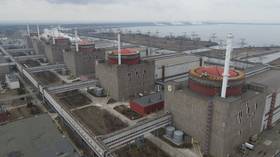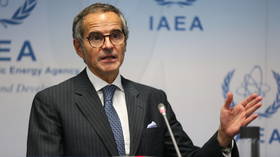Russia urges IAEA to publicly reveal Ukrainian attacks on nuclear plant

Moscow has appealed to the International Atomic Energy Agency (IAEA), urging it to publicly record the recurring attacks by the Ukrainian army on the Zaporozhye Nuclear Power Plant.
The plant is Europe’s largest atomic power station, with six reactor cores capable of generating a gigawatt of electricity each. The plant came under Moscow’s control in 2022, early on in the Ukraine conflict, and was formally transferred to Rosatom management after Zaporozhye Region was incorporated into Russia following a referendum. Kiev claimed it was illegally occupied and insisted that Russia kept heavy weapons at the plant and was attacking Ukrainian forces from it.
Kiev has since targeted the facility with artillery, missile, and drone attacks, and has sent armed groups to try and seize it. Earlier this week, the NPP lost the connection to its only remaining back-up power line, a key source of the electricity it needs to cool its reactors, with the IAEA team on the ground reporting that it heard “numerous rounds of artillery fire” in the vicinity of the plant. On Friday, the NPP wrote on Telegram that it has been repeatedly attacked by Ukrainian drones recently.
Russian Foreign Ministry spokeswoman Maria Zakharova warned Kiev on Friday against further attacks on the plant, noting that they could harm critical infrastructure and destabilize the facility. She also appealed to the IAEA to make the recent attacks and their perpetrators known to the public.
“We strongly urge the IAEA and its leadership to actively use the experts present at the station to publicly record all cases of attacks from the Ukrainian side and clearly state where the threat to the safe operation of this facility really comes from,” she said in a statement.
In a statement to TASS late Friday, the IAEA said it was aware of the reported attacks and was studying them, but refused to give any further details.
The IAEA deployed a permanent on-site monitoring mission to the plant in September 2022, but has repeatedly declined to publicly assess the incidents involving the facility or name Ukraine as the perpetrator.
Experts from the agency said the plant is now entirely dependent on the only remaining 750-kilowatt line for off-site power. The NPP reported that the loss of connection to the backup power line is being investigated, and noted that the radiation background at the station and the surrounding area so far remains unchanged.













